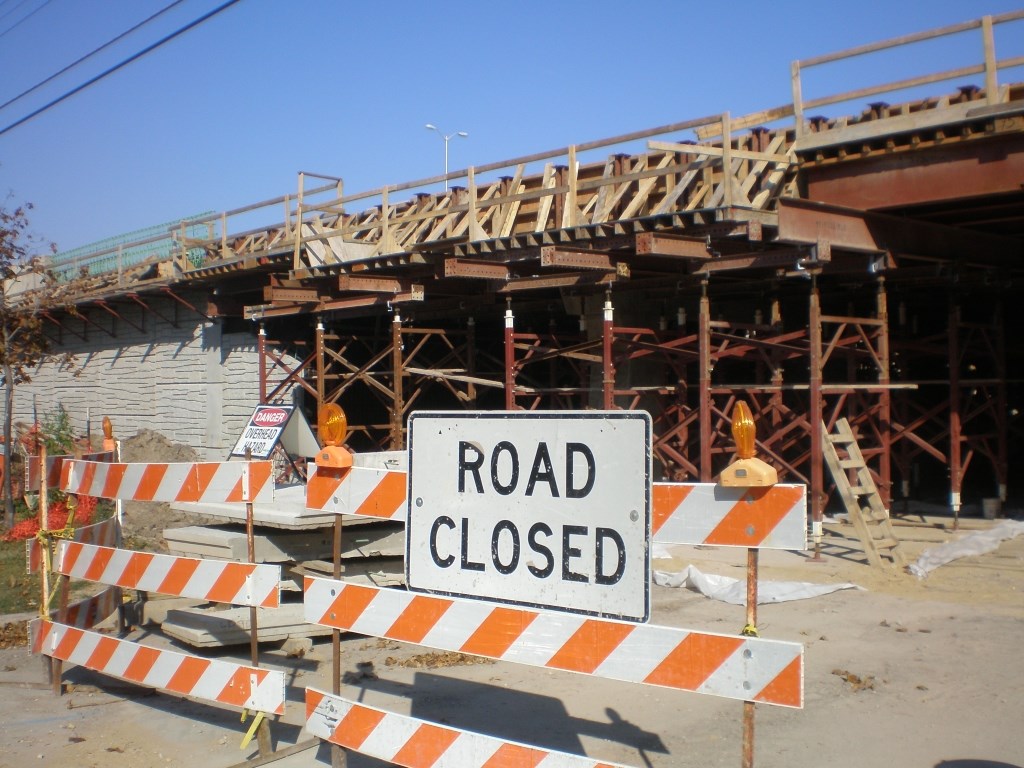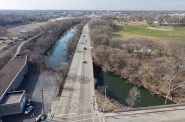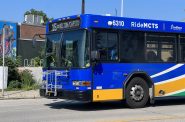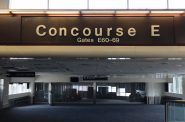Don’t Expand I-94
Gov. Evers is wrong. It won’t help economy, will waste money and increase pollution.

Dave Reid.” width=”1024″ height=”768″ />
Road Closed. Photo by Dave Reid.Gov. Evers recently dusted off the previously shelved plan to expand I-94 between the Marquette and Zoo Interchanges. This project would cost an estimated $1 billion dollars to expand a mere 3.5 miles of interstate. Proponents claim it will create jobs and reduce congestion and travel times, however this expansion plan should be put back on the shelf, or better yet the garbage, for the following reasons. First, contrary to popular opinion, highway expansion does not reduce congestion and increases our dependence on cars. Secondly, if Wisconsin, the US, and the world have any chance of keeping global warming below 2.7° F, we need to immediately stop investing in infrastructure that will generate additional greenhouse emissions. Finally, endless highway expansion is a hugely expensive misuse of taxpayer dollars. Wisconsin should not expand I-94 and should not continue expanding highways.
Expanding highways does not reduce congestion. It encourages more driving and congestion remains constant or increases. Transportation for America recently released their report The Congestion Con which details how nationwide we’ve spent the last several decades and hundreds of billions of dollars widening and building new highways in order to “curb congestion.” Yet, this strategy has utterly failed to solve the problem. In fact, between 1993 and 2017, 30,511 new freeway lane-miles were added in the nation’s largest 100 urbanized areas, an increase of 42 percent. This rate of expansion far outstripped the 32 percent growth in population in those areas in the same period. Despite this massive investment, congestion has only increased by a staggering 144 percent. More locally, WisDOT admits that the Marquette interchange did not reduce congestion but blames that fact on a need to expand I-94 west of the Marquette Interchange. However, that begs the question where will it end? Adding lanes does not reduce congestion.
Finally, Wisconsin spends too much money building highways and not enough on maintenance, public transit, or other state priorities. The I-94 expansion is expected to cost $991 million, however Wisconsin’s last round of highway expansion cost nearly 100 percent more than WisDOT projections, so the price could come in closer to $1.9 billion for a mere 3.5-mile expansion. WisDOT likes to point out that in building highways much of the funding is frequently covered by federal grants; what they don’t like to point out is that Wisconsin is responsible for nearly all maintenance costs. For example, federal funds generally make up about 25 percent of WisDOT’s budget but usually only cover about 0.3 percent of highway maintenance and repair. Moreover, in Wisconsin, gas taxes and user fees are insufficient to cover the state’s portion of WisDOT’s budget. Therefore, since 2013 the legislature has been transferring money from the General Fund to WisDOT. General Fund money could be used to increase K-12 education funding, lower tuition for the UW System, or increase maintenance of State Parks. However, because Wisconsin keeps building highways, since 2013 we’ve had to divert $265.8 million from the General Fund to the Transportation Fund. This diversion comes on top of the fact Wisconsin already diverts the maximum amount allowable by law from the Transportation Alternatives Set-Aside Program to highways. This is money that could (and should) be going to improve bicycle, pedestrian, and transit infrastructure but is instead continuously redirected to more highways. To further illustrate the financial unsustainability of Wisconsin’s obsession with expanding highways we can’t afford to maintain, since 2013 the state of Wisconsin has spent more on debt service than on highway maintenance yet we continue to spend billions of dollars on highway construction. Continuously expanding highways is a financially irresponsible waste of taxpayer dollars.
Wisconsin should stop expanding highways and instead focus on maintaining and repairing the highways we have and building out the states multimodal network. Expanding highways does not reduce congestion, expanding highways is the wrong thing to do for our shared climate, and expanding highways is financially irresponsible. Wisconsin should cancel all proposed and future highway expansion projects.
James Davies is the Executive Director of Bublr Bikes.
More about the I-94 East-West Expansion
- Transportation: Fix At Six Coalition Sues State, Federal Government Over I-94 Expansion - Graham Kilmer - Aug 20th, 2024
- WisDOT to host I-94 East-West Freeway Project public meetings - Wisconsin Department of Transportation - Jun 12th, 2024
- Open Houses Announced For I-94 Widening - Jeramey Jannene - Jun 6th, 2024
- ‘Fix at Six’ Group Wants I-94 Expansion Delayed For Civil Rights Report - Jeramey Jannene - Mar 20th, 2024
- Coalition Admonishes I-94 expansion Record of Decision - Sierra Club - Mar 20th, 2024
- Feds Approve Interstate 94 Expansion - Jeramey Jannene - Mar 8th, 2024
- Advocates condemn approval of I-94 expansion - Sierra Club - Mar 8th, 2024
- I-94 East-West Project Receives Federal Approval - Wisconsin Department of Transportation - Mar 8th, 2024
- Federal Government Investigating Civil Rights Complaint About I-94 Expansion - Evan Casey - Jan 11th, 2024
- Op Ed: 8-Lane I-94 Expansion Is Worst for Carbon Emissions - Cassie Steiner, Cheryl Nenn and Terry Wiggins - Dec 18th, 2023
Read more about I-94 East-West Expansion here
Op-Ed
-
Milwaukee Needs Commitment to Workforce Housing
 Apr 21st, 2025 by Ryan Pattee and Shar Borg
Apr 21st, 2025 by Ryan Pattee and Shar Borg
-
Why the Knowles-Nelson Stewardship Program Matters
 Apr 20th, 2025 by State Sen. Jodi Habush Sinykin
Apr 20th, 2025 by State Sen. Jodi Habush Sinykin
-
Invest in a Successful Future for Wisconsin’s Children
 Apr 8th, 2025 by County Executive David Crowley
Apr 8th, 2025 by County Executive David Crowley
Transportation
-
Milwaukee Will Shrink Its Secret Highway
 Apr 24th, 2025 by Jeramey Jannene
Apr 24th, 2025 by Jeramey Jannene
-
Supervisors Nix Uber Rides for Bus Drivers
 Apr 17th, 2025 by Graham Kilmer
Apr 17th, 2025 by Graham Kilmer
-
International Terminal Construction Could Begin This Year
 Apr 17th, 2025 by Graham Kilmer
Apr 17th, 2025 by Graham Kilmer





















I agree with this op-ed. We do not need an expanded highway. It will be counterproductive.
Let’s use the state money for a regional mass transit system. Such a system will expand job opportunities for people without cars, expand the employee pool for employers, and might even take cars off highways if people have a fast, convenient way to get to work without driving. In addition, the emphasis on highways has a certain amount of racial bias built into it.
Expansion between the Marquette and Zoo interchanges will improve flow and especially safety. Cars may continue to increase, but most going forward will be hybrid or completely electric. Enough with the dangerous bottlenecks, let’s complete this stretch of suicide freeway.
The $1 billion cost of this 3.5-mile project proves that today’s gas taxes don’t come close to covering highway costs.
At 35 mpg (not unreasonable for highway driving), each car burns 0.1 gallons traveling those 3.5 miles.
At 49.2¢/gal (combined state and federal gas tax), each car will pay less than 5¢ in gas tax on this newly rebuilt highway.
At a nickel/trip, you need 20 billion trips to cover the $1 billion construction expense.
If you assume the project lasts 50 years (before you must do it all over again), you need 400 million annual trips to recover the cost—more than 1 million trips/day.
Will that stretch of I-94 ever come close to a million daily trips (even if expanded to 8 lanes)? No! WisDoT traffic counts in 2009 (most recent I’ve seen) show nothing even hitting 200,000/day.
I doubt that gas taxes will even cover 25% of the total cost (leaving nothing for other highway costs like plowing, policing, pothole repairs, lighting, and resurfacing).